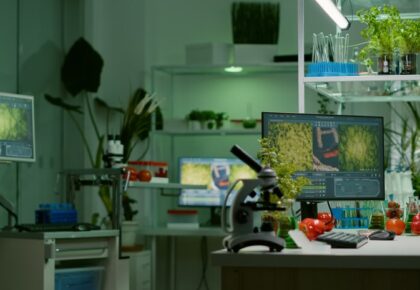
The agricultural industry has witnessed a significant transformation, thanks to the rapid growth of AgriTech startups. These innovative companies are leveraging technology to revolutionize traditional farming methods, leading to increased efficiency, sustainability, and productivity in the sector. According to AgFunder’s AgriFood Tech Investing Report, AgriTech startups have received the highest level of investment among all sectors within the food and agriculture industry. This substantial influx of funding highlights the immense potential and promising future of AgriTech in shaping the agricultural landscape.
Precision Agriculture
One of the most notable advancements facilitated by AgriTech startups is precision agriculture. This approach utilizes cutting-edge technologies such as remote sensing and data analytics to optimize farming practices. A study published in the Journal of Applied Remote Sensing revealed that precision agriculture technologies can lead to a 10–20% increase in crop productivity and a 30–50% reduction in water and chemical usage. These staggering statistics showcase the transformative power of AgriTech in addressing critical challenges faced by the agricultural sector.
Usage of drones
Remote sensing, a key component of precision agriculture, involves the use of drones, satellites, and other imaging technologies to gather real-time data about crops. For example, drones pick apples in Israel. The drone is able to determine the degree of ripeness of apples, the level of sugar content, and whether they have any diseases or worms. The farm also has machines that pollinate apple blossoms instead of insects and determine the best time to do so. This data is then analyzed to monitor crop health, identify nutrient deficiencies, detect diseases, and predict yield potential. By providing farmers with precise and timely information, remote sensing enables targeted interventions, such as the precise application of fertilizers and pesticides, resulting in improved resource utilization and reduced environmental impact.
Optimization of the water usage
AgriTech startups are also at the forefront of developing innovative solutions to tackle water scarcity, a pressing issue in agriculture. For instance, a growing AgriTech startup has developed a smart irrigation system that utilizes sensor technology to monitor soil moisture levels and optimize water usage in agricultural fields. With the help of Internet of Things (IoT) devices and sensor networks, these startups enable precise irrigation management, preventing water wastage and optimizing water usage based on plant needs. Advanced monitoring systems allow farmers to monitor soil moisture levels, weather conditions, and even predict evapotranspiration rates. By fine-tuning irrigation practices, AgriTech startups are helping farmers conserve water resources while maintaining optimal crop growth.
Vertical farming
Furthermore, AgriTech has paved the way for vertical farming, an innovative approach that maximizes space utilization and minimizes environmental impact. Vertical farming involves growing crops in vertically stacked layers or controlled environments, such as indoor hydroponic systems. AgriTech startups are utilizing technologies like LED lighting, climate control systems, and automated nutrient delivery to create ideal growing conditions for crops. This method eliminates the need for large land areas, reduces dependence on pesticides, and minimizes transportation costs, making fresh produce more accessible and sustainable.
Integration of AI and machine learning
The integration of artificial intelligence (AI) and machine learning (ML) is another exciting aspect of AgriTech startups. By analyzing vast amounts of data, AI-powered systems can provide actionable insights and predictions. For instance, ML algorithms can analyze historical weather patterns, crop yields, and market data to offer farmers optimized planting schedules and yield projections. AI-powered systems can also aid in early pest detection, identifying patterns that may not be apparent to the human eye. These advancements empower farmers to make informed decisions, optimize resource allocation, and mitigate risks, ultimately enhancing overall productivity.
Agritech Worldwide
The growth of AgriTech startups is not limited to developed countries; it is making a significant impact on developing nations as well, such as India, Kenya, Brazil, and Vietnam. With the help of mobile technology, these startups are reaching smallholder farmers in remote areas, providing them with access to vital agricultural information, market prices, and weather forecasts. Mobile apps and platforms also enable farmers to connect with buyers directly, eliminating intermediaries and ensuring fair prices for their produce. By bridging the information gap and improving market access, AgriTech startups are empowering smallholder farmers and fostering economic growth in rural communities.
Agritech Advancements
AgriTech startups are revolutionizing agriculture with innovations that boost productivity, sustainability, and resource efficiency. Through precision agriculture technologies like remote sensing, they enhance crop yields while reducing water and chemical usage. These startups lead the way in tackling water scarcity through precise irrigation management and vertical farming. AI and ML integration enables data-driven decision-making and predictive analytics, empowering farmers to optimize practices and reduce risks. Additionally, AgriTech startups reach remote smallholder farmers, providing information and market opportunities. The growth and investment in AgriTech underscore its potential to transform agriculture for a sustainable and efficient future.
As the growth of AgriTech startups continues to reshape the agricultural industry, it is no wonder that these advancements and other pressing topics will be deeply debated at the upcoming 135th PIFW: “Feeding the World: Investing in Agricultural Innovation and Sustainability”. This gathering provides a secure place for investment experts, agriculture industry leaders, and stakeholders to come together and explore the transformative potential of AgriTech innovations. This highly anticipated event will delve into emerging trends, investment prospects, and the social and environmental impact of AgriTech, ensuring that the discussions taken reflect the cutting-edge advancements and revolutionary changes taking place in the agricultural sector. To become a part of this, make sure to register for the event.











